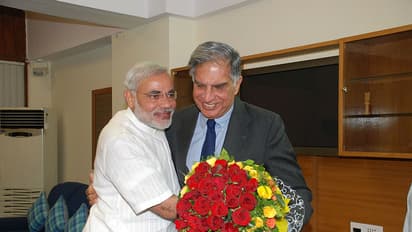How Modi's one-word SMS to Ratan Tata shifted the Tata Nano project from West Bengal to Gujarat

Synopsis
In the wake of Ratan Tata's passing, numerous intriguing anecdotes about the veteran industrialist's life have emerged, including a notable one involving Prime Minister Narendra Modi.
Ratan Naval Tata, the revered chairman emeritus of the Tata Group and an iconic figure in Indian industry, passed away late Wednesday evening at Breach Candy Hospital in Mumbai. He was 86 years old and had guided the Tata Group for over two decades, elevating the salt-to-software conglomerate to remarkable heights and expanding its global footprint.
In the wake of his passing, numerous intriguing anecdotes about Ratan Tata's life have emerged, including a notable one involving Prime Minister Narendra Modi.
A single SMS from then-Gujarat Chief Minister Narendra Modi to Tata Group Chairman Ratan Tata in 2008 marked a significant turning point in Indian industrial history. The text, a simple yet powerful "Welcome," came in the wake of Tata's announcement at a press conference in Kolkata regarding the withdrawal of the Tata Nano project from West Bengal due to violent protests led by Trinamool Congress (TMC) chief Mamata Banerjee.
On October 3, 2008, Tata, visibly distressed by the unrest in West Bengal, announced the exit of the Nano project, which was initially set to be produced in Singur. Modi, quick to seize the opportunity, sent a brief SMS that would change the trajectory of the project and, ultimately, the automotive landscape in India. Within four days, Tata confirmed that the plant would be relocated to Sanand in Gujarat, marking the beginning of a new era for the state.
In a later inauguration ceremony of the Tata Nano plant in Sanand in 2010, Modi reflected on the impact of that SMS. "When Ratan Tata said in a press conference in Kolkata that they are leaving West Bengal, I sent him a short SMS saying 'welcome'. And now you can see what a Re 1 (worth) SMS can do," Modi remarked, highlighting the importance of swift communication and decisive action in governance.
The Tata Nano plant in Sanand was built at an impressive investment of ₹2,000 crore. Modi emphasized the Gujarat government's commitment to facilitating the project, stating that numerous countries expressed willingness to support the Nano initiative. However, he underscored that Gujarat's administrative efficiency was pivotal in keeping the project within India.
During the inauguration, Modi lauded the state's government machinery for aligning itself with corporate culture, ensuring a fast-paced development environment conducive to business. This proactive approach not only attracted Tata but also set a benchmark for other industrialists considering investment in Gujarat.
The rollout of the first Tata Nano from the Sanand plant in June 2010 was a momentous occasion. Ratan Tata expressed immense gratitude to the Gujarat government for its unwavering support in establishing the facility. "When we searched for another Nano plant, we wanted to move to peace and harmony. Gujarat stood out against all others in guaranteeing us all that we needed. 'It was not just Tata's project, it is our project,' Modi told us. We owe a great lot of gratitude for the support and confidence placed in us," Tata stated.
The successful launch of the Nano, which was marketed as the world's cheapest car, aimed to make car ownership accessible to the masses. However, despite its innovative design and ambitious vision, the Tata Nano faced various challenges in the market.
After nearly a decade of production, Tata Motors announced the discontinuation of the Nano in 2018. Despite its initial promise, the Nano struggled with sales and brand perception. However, the journey of the Tata Nano project remains a testament to how strategic communication and timely decision-making can influence industrial trajectories in India.
Stay updated with the Breaking News Today and Latest News from across India and around the world. Get real-time updates, in-depth analysis, and comprehensive coverage of India News, World News, Indian Defence News, Kerala News, and Karnataka News. From politics to current affairs, follow every major story as it unfolds. Get real-time updates from IMD on major cities weather forecasts, including Rain alerts, Cyclone warnings, and temperature trends. Download the Asianet News Official App from the Android Play Store and iPhone App Store for accurate and timely news updates anytime, anywhere.